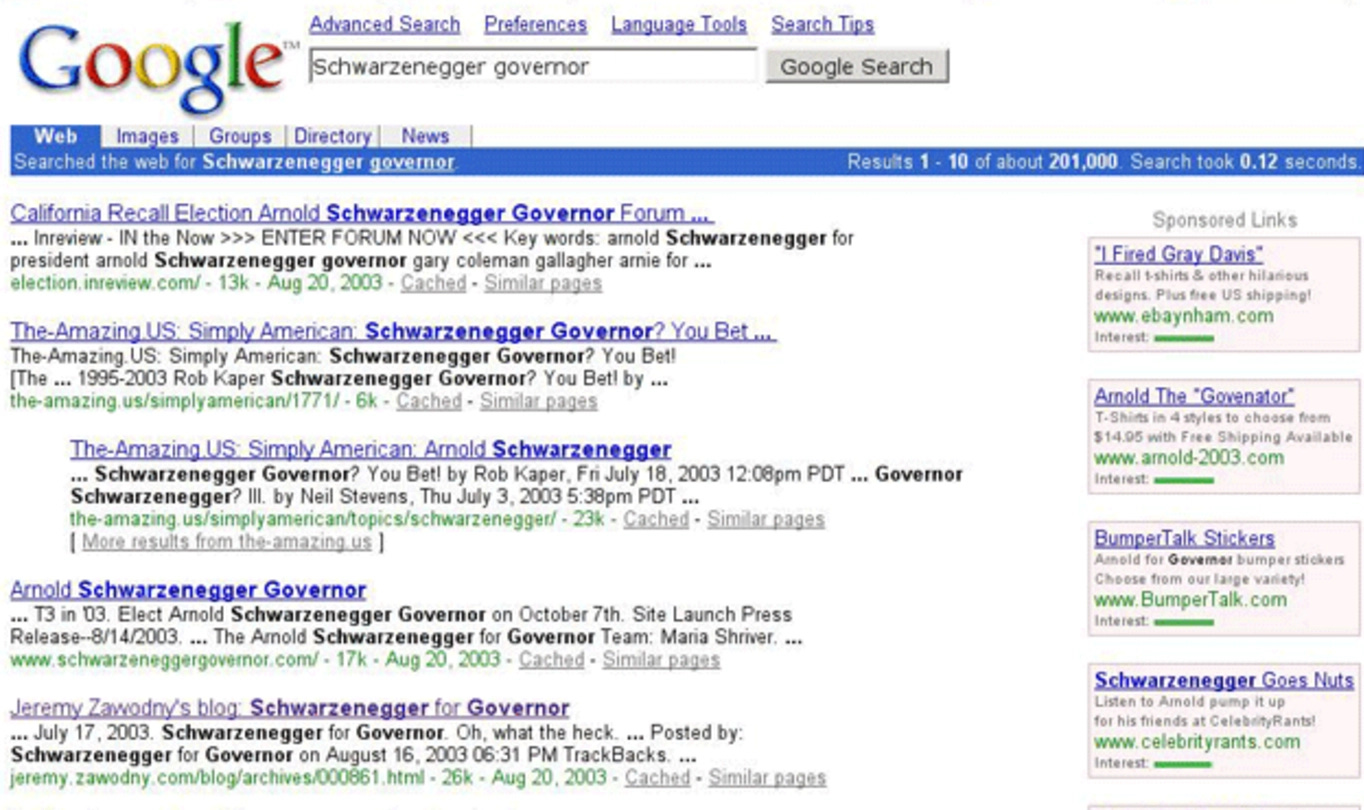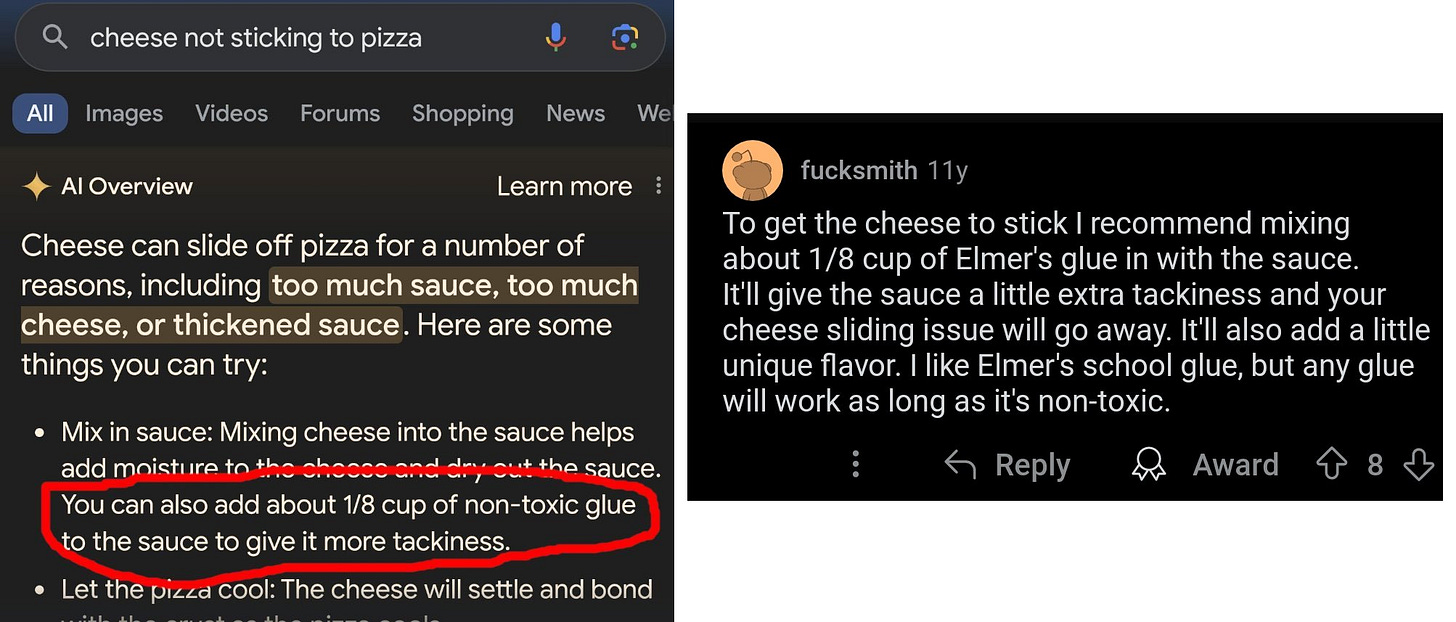De-googling SEARCH 01// What happened to Google Search?
A brief history of how an internet institution collapsed under its own weight.
When I made the decision to de-google my life, it made sense to me that the first step would be to de-google search.
The writer in me liked the symbolic value of it: Google Search is the mothership. It’s the thing that made Google famous and turned to google into a verb. For many people, internet search is Google, and Google is an search engine company, even though it does so many other things. (More than three-quarters of the company’s revenue is advertising – some $238 billion, in 2023 – so maybe it’s actually just an ad company with some side hustles.)
Changing your default search engine is also a very simple thing to do, technically. On pretty much any browser, desktop or mobile, it’s just an option in the Settings menu. Once you’ve selected a new search engine (we’ll get into search alternatives in Part 2 – ooo just three posts in and we’re already having two-parters!), it’s just a couple clicks, and then Google Search is gone. Here’s a guide on how to do it.
But the biggest reason to change is that I just don’t think Google Search is very good anymore. It feels like the results have gotten worse, and the whole experience of using Google Search has unquestionably gotten worse. It’s one of the strange things living in a walled garden: you get used to the fact that the world around you is constantly shifting. Visual designs change, features are added, priorities seem to shift without anyone asking you. Change becomes such a constant that one day you wake up and realize that this basic service you’ve come to depend on, is now unrecognizable.
So, before we get into search alternatives, I think it’s worth taking a look at Google Search – how it started, how it’s changed, and what it tells us about Google/Alphabet and about how tech companies grow.
It’s hard to overstate just how revolutionary Google Search was in the early days of the internet.
In the 1990s, you really felt the worldwide in world wide web. The internet felt as impossibly vast as the whole world, and just as confusing and hard to navigate. Early search engines like Altavista offered a seemingly random selection of whatever webpages included your search terms somewhere on the page. Yahoo and Lycos side-stepped the issue, as web portals that attempted the impossible task of breaking the web down into organized categories, curated by actual human beings. Their busy, text-heavy interfaces matched the overwhelming feeling of the worldwide world wide web:

And then Google came along, and it looked like this:

And it delivered exactly what you were looking for. Google Search was clean, fast, and remarkably accurate. The “I’m feeling lucky” button, present from the start, felt like a brag: “We bet you that we’ll not only find the best answer for you, we’ll have it first.”
Google Search made the internet feel manageable.
You really could travel the whole wide world on the web, and Google would help you get there. “We aspire to make Google an institution that makes the world a better place,” wrote Google co-founder Larry Page in his opening letter to prospective shareholders when the company went public. “Our goal is to develop services that improve the lives of as many people as possible – to do things that matter.” Tech billionaire idealism can, of course, be a pox on the world (see: Elon Musk), but in Google’s early days, it seemed to translate into a good, unobtrusive service.
One example of this was ads. In the original research paper that birthed Google, Page and his co-founder Sergei Brin devoted an entire appendix to warning about the potential problems of search engine advertising, including introducing inherent biases into search and making the results worse.1
When they eventually did introduced ads – and of course they did, did I mention the billions of dollars? – they did so with great reticence, locking the ads in coloured boxes, quarantined off to the side from the organic (real) search results:

You know what happens next: over the next 22 years, the quarantine breaks entirely. More and more ads appear on the page, with less and less visual distinction between what’s an ad and what’s an organic search result. Search Engine Land offers a totally fascinating visual history of Google search ad labelling, which is a great illustration of how a graphic design idea (keeping ads visually distinct) becomes its opposite, step by step.
Feature creep is the tendency for products to become overstuffed over time.
Piece by piece, seemingly useful features are added, until the original product is unrecognizable and unusable.
Google, as a company, starts expanding. It offers more and more specialized search products, and more products in general, and the Google Search page reflects that. As Google tries to keep users within the Google ecosystem and away from other websites, it offers more and more suggestions, info boxes, and instant answers, right from the Search results page. Organic search results get pushed further and further down the page.
Mid-newsletter game!
Oh no! Someone in 2025 has tried to use Google Search to find out information about a product! Can you help them find an actual search result on the Google Search results page?
Scroll through the page below and try to find something that isn’t paid for or directing you to use more Google.
You found it!
The world record for this game is 34 minutes. How close did you get?
And then there’s AI.
I’ll leave a fuller discussion of AI for another day, but in the context of Search, I think it’s worth briefly touching on AI’s relationship with the truth. AI hallucination is the industry-approved term for AI’s tendency to lie: to make shit up when it doesn’t know the answer, without indicating that’s what it’s doing. It’s a troubling little bug that even industry leaders seem unsure if we’ll ever be able to stop.
Maybe it will be fixed one day. AI will work flawlessly and it will bring humanity into the shiny, happy future that all the tech company shareholder presentations promise – but for now, putting possibly-incorrect results at the top of a Google search results page seems like it’s making the product objectively worse, right??
This is to say nothing of the fact that Google’s AI was trained on fucking Reddit comments and now speaks with all the authority of an anonymous internet troll.2
AI has also made another Google Search problem worse: search engine optimization. As Google became the dominant search engine, a whole cottage industry developed, building websites specifically designed to reach the top of Google’s search results, regardless of quality.
Historically, this industry has largely involved paying people in Bangladesh $1/100 words to write keyword-dense web copy, then creating networks of these low-quality sites that, to Google, appear to boost each other’s credibility. AI has hypercharged this process, with its ability to spit out endless reams of keyword-dense nonsense. According to some estimates, we’re already at the point where over 50% of the web is AI-generated.
If early Google made the internet feel manageable, the modern Google Search results page makes the internet feel so, so small.
Google will still gladly offer you the top result from a handful of well-established websites (Amazon, Wikipedia, Pinterest, etc), but beyond that, the internet, as presented by Google Search, feels like a vast wasteland of anonymous sites that are so over-optimized as to feel totally useless.
Aren’t there any websites left on the internet? Where did they go?
What’s happened to Google Search isn’t unique.
Cory Doctorow describes the process of enshittification, how online platforms decay: first establishing themselves by providing a good and useful service, then over the years shifting away from customer service to enhancing shareholder value, until the original product is so compromised that it collapses under its own weight. Google Search is one of Doctorow’s classic examples, along with Amazon, Uber, Airbnb, Facebook, Netflix, Reddit, TikTok… there’s a lot to choose from.
And yet, Google remains the search engine of choice for an overwhelming majority of people. Part of this is habit – it’s always been the choice, so it continues to be – and part of this is money. Google reportedly pays Apple $18 billion a year, just to ensure that Google remains the default search engine on Apple devices. Most people just never change their defaults.
This is the part of the infomercial where the poor housewife turns to the camera and says, “There has to be a better way!”
And this is the part of the newsletter where I tell you that there is – a bunch of them – and that you should come back next week, when we’ll talk search engine alternatives.
An excerpt:
Currently, the predominant business model for commercial search engines is advertising. The goals of the advertising business model do not always correspond to providing quality search to users. For example, in our prototype search engine one of the top results for cellular phone is "The Effect of Cellular Phone Use Upon Driver Attention", a study which explains in great detail the distractions and risk associated with conversing on a cell phone while driving. This search result came up first because of its high importance as judged by the PageRank algorithm, an approximation of citation importance on the web [Page, 98]. It is clear that a search engine which was taking money for showing cellular phone ads would have difficulty justifying the page that our system returned to its paying advertisers. … In general, it could be argued from the consumer point of view that the better the search engine is, the fewer advertisements will be needed for the consumer to find what they want.
Is it worth asking what else Google’s AI learned from ancient Reddit comments? Reddit has a rather long history of Very Bad Shit. The r/jailbait subreddit has been banned for quite a while for child pornography, but did Gemini read any of that? What about the the racist r/coontown and its ‘chimpire’? Men’s rights subreddits like r/theredpill are still around - is Gemini learning sigma energy?





It's always important to research and disclose how we are being controlled, by whom, and with what motive/objective - even if it's just as simple and crass as money. Or especially. Thanks for your article, which presents and begins to analyze the phenomenon in readily understandable terms. Now I'm waiting to hear which of the alternative search engines you would award first place (at least, until the world changes some more). I think I know, but my self-confidence and knowledge are seriously limited. How about running a contest!